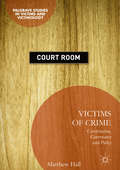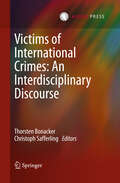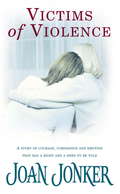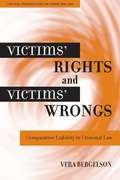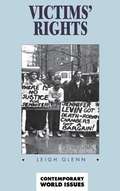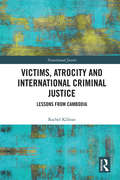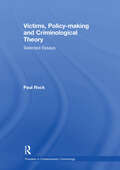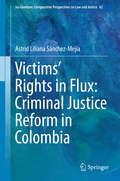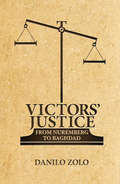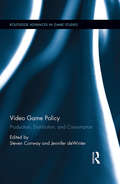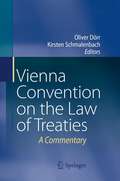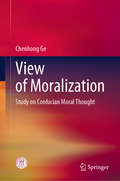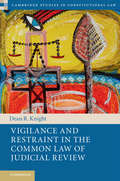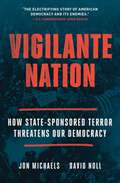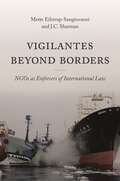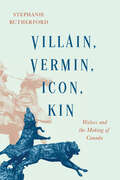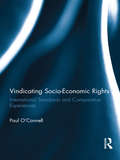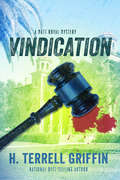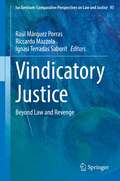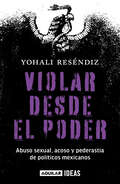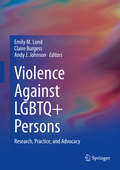- Table View
- List View
Victims of Crime
by Matthew HallOver the last thirty years, victims of crime have become a staple topic of media interest and policy-making discourse. Drawing on an extensive programme of first-hand empirical data gathered at some 300 English criminal trials, this book examines the practical outcomes of this reform agenda and assesses the meaning, implications and impact of the government's pledge to put victims 'at the heart' of the criminal justice system. The study also draws on in-depth interviews with barristers and solicitors, as well as court administrators and other Local Criminal Justice Board members. The book delves into the policy-making process behind these reforms, based on interviews conducted at key government departments, and offers a model for what a genuinely 'victim centred' criminal justice system might look like in the twenty-first century, drawing on the psychological and sociological literature on narrative responses to traumatic events.
Victims of International Crimes: An Interdisciplinary Discourse
by Thorsten Bonacker Christoph SafferlingIn international law victims' issues have gained more and more attention over the last decades. In particular in transitional justice processes the victim is being given high priority. It is to be seen in this context that the Rome Statute for the International Criminal Court foresees a rather excessive victim participation concept in criminal prosecution. In this volume issue is taken at first with the definition of victims, and secondly with the role of the victim as a witness and as a participant. Several chapters address this matter with a view to the International Criminal Court (ICC), the Extraordinary Chambers in the Courts of Cambodia (ECCC) and the Trial against Demjanjuk in Germany. In a third part the interests of the victims outside the criminal trial are being discussed. In the final part the role of civil society actors are being tackled. This volume thus gives an overview of the role of victims in transitional justice processes from an interdisciplinary angle, combining academic research and practical experience.
Victims of Violence
by Joan JonkerHaving become increasingly concerned about the rise in crime and the softly-softly approach to punishing offenders, Joan Jonker realised that little was being done for the victims of crime. She set up the charity Victims of Violence and went on to raise over two million pounds and to help twelve thousand victims whose voices would not otherwise have been heard. Victims of Violence is the moving, no-holds-barred story of Joan Jonker's fight for justice. Of the heartbreak and suffering behind the crime statistics and of Joan's courage and compassion in the face of adversity.
Victims' Rights and Victims' Wrongs
by Vera Bergelson"Don't blame the victim" is a cornerstone maxim of Anglo-American jurisprudence, but should the law generally ignore a victim's behavior in determining a defendant's liability?Victims' Rights and Victims' Wrongscriticizes the current criminal law approach and outlines a more fair, coherent, and efficient set of rules to recognize that victims sometimes co-author their own losses or injuries. Evaluating a number of controversial cases involving euthanasia, sadomasochism, date rape, battered wives, and "innocent" aggressors, Vera Bergelson builds a theoretical foundation for reform. Her approach to comparative criminal liability takes into account the actions of both the perpetrator and the victim and offers a unitary explanation for consent, self-defense, and provocation. This innovative book supplies a practical and coherent mechanism for evaluating the impact of a victim's conduct on a perpetrator's liability in a variety of circumstances, including those that are now artificially excluded from comparative analysis.
Victims' Rights: A Reference Handbook
by Glenn LeighAn excellent resource for students, legislators, victims' advocacy groups, and journalists, defining and discussing issues of victims' rights in the US, current policies, crime-related legislation, and key Supreme Court cases. Offers a detailed chronology, biographical sketches of those involved in upholding and extending victims' rights, descriptions and contacts for organizations serving the interests of victims, and an annotated bibliography of print and nonprint sources. Annotation c. by Book News, Inc., Portland, Or.
Victims, Atrocity and International Criminal Justice: Lessons from Cambodia
by Rachel KilleanWhile international criminal courts have often been declared as bringing ‘justice’ to victims, their procedures and outcomes historically showed little reflection of the needs and interests of victims themselves. This situation has changed significantly over the last sixty years; victims are increasingly acknowledged as having various ‘rights’, while their need for justice has been deployed as a means of justifying the establishment of international criminal courts. However, it is arguable that the goals of political and legal elites continue to be given precedence, and the ability of courts to deliver ‘justice to victims’ remains contested. This book contributes to this important debate through an examination of the role of victims as civil parties within the Extraordinary Chambers in the Courts of Cambodia. Drawing on a series of interviews with civil parties, court practitioners and civil society actors, the book explores the way in which both the ECCC and the role of victims within it are shaped by specific political, economic and legal contexts; examining the ‘gap’ between the legitimising value of the ‘imagined victim’, and the extent to which victims are able to further their interests within the courtroom.
Victims, Policy-making and Criminological Theory: Selected Essays (Pioneers In Contemporary Criminology Ser.)
by Paul RockPaul Rock began studying sociological criminology in 1961 and his intellectual history has run parallel to and in conversation with the evolution of the discipline over that long period. He became a professional scholar when symbolic interactionism, sociological phenomenology and 'labelling theory' were taking form within criminology, and it is to those ways of viewing the social world that he still clings, although he has sought also to reflect critically upon them as time went by. Having completed a DPhil dissertation on debt collection as a moral career, and largely as a matter of serendipity, he was to take to empirical research just as policies for victims of crime were being developed by governments across the developed world and, finding himself embedded as a visitor in a Canadian federal criminal justice ministry when a federal-provincial task force was being mooted, he was able to embark on the first of a sequence of field studies of policy-making centred chiefly on victims. Those two interlaced preoccupations, theoretical and empirical, continually informed much, if not all, of his subsequent work, contributing to what has been, in effect, a running series of comparative ethnographies of government decision-making about the role of the victim in and around the criminal justice system.
Victims’ Rights in Flux: Criminal Justice Reform in Colombia (Ius Gentium: Comparative Perspectives on Law and Justice #62)
by Astrid Liliana Sánchez-MejíaContributing to the literature on comparative criminal procedure and Latin American law, this book examines the effects of adversarial criminal justice reforms on victim’s rights by specifically analyzing the Colombian criminal justice reform of the early 2000s. This research focuses on the production, interpretation, and implementation of rules and institutions by exploring how different actors have employed the concept of victims and victims’ rights to promote their agendas in the context of criminal justice reforms. It also analyzes how the goals of these agendas have interplayed in practice. By the early 2000s, it seemed that the Colombian criminal justice system was headed towards a process characterized by broader victim participation, primarily because of the doctrine of the Constitutional Court on victims’ rights. But in 2002, the Colombian Attorney General promoted a more adversarial criminal justice reform. This book argues that this reform represented a sudden and unpredicted reversal of the Constitutional Court’s doctrine on victim participation, even though one of the central justifications for the reform was the need to satisfy human rights standards and adhere to the jurisprudence of the Constitutional Court on victims’ rights. In the criminal justice reform of the early 2000s and its subsequent modifications, the promotion of a dichotomous interpretation of the adversarial model—which conceived the criminal process as a competition between prosecution and defense—served to limit victim participation. This study examines how conceptions of victims’ rights emerged out of the struggles between different and at times competing agendas. In the Colombian process of reform, victims’ rights have been invoked both as a justification for criminal sanctions and as an explanation for crime prevention and restorative justice. After assessing quantitative and qualitative data, this book concludes that punitive approaches to victims’ rights have prevailed over restorative justice perspectives. Furthermore, it argues that punitiveness in the criminal justice system has not resulted in more protection for victims. Ultimately, this research reveals that the adversarial criminal justice reform of the early 2000s has not substantially improved the protection of victims’ rights in Colombia.
Victors' Justice: From Nuremberg to Baghdad
by Danilo ZoloInternational tribunals are shown to be little more than a tool of Western imperialismVictors' Justice is a potent and articulate polemic against the manipulation of international penal law by the West, combining historical detail, juridical precision and philosophical analysis. Zolo's key thesis is that contemporary international law functions as a two-track system: a made-to-measure law for the hegemons and their allies, on the one hand, and a punitive regime for the losers and the disadvantaged, on the other. Though it constantly advertised its impartiality and universalism, international law served to bolster and legitimize, ever since the Tokyo and Nuremberg trials, a fundamentally unilateral and unequal international order.
Vidas Implosivas: El Robo Invisible y Las Consecuencias Humanas
by David P. WarrenCuando dos hombres enmascarados toman un concurrido banco de Los Ángeles a plena luz del día, la policía, SWAT y los medios cubren todos los ángulos visibles del banco. A pesar de cientos de ojos en el banco, casi un millón de dólares, y los propios ladrones, desaparecen sin dejar rastro. Los detectives de LAPD Stacey Gray y Jeff Butler comienzan a investigar el caso que desafía la lógica sin pistas y poca evidencia. Pronto, los secretos que cambian la vida quedan expuestos y sus mundos se vuelven del revés. ¿Quiénes son los ladrones y dónde está el dinero? Alabanza: ★★★★★ "Novela de alcaparras bien escrita. Mantuve mi interés todo el tiempo". ★★★★★ "Intersección única entre la policía local y el FBI teniendo en cuenta los dilemas morales y éticos en el camino. Entretenimiento de ritmo rápido". ★★★★★ "El tema es actual y los personajes interesantes. Una gran lectura".
Video Game Policy: Production, Distribution, and Consumption (Routledge Advances in Game Studies)
by Steven Conway and Jennifer deWinterThis book analyzes the effect of policy on the digital game complex: government, industry, corporations, distributors, players, and the like. Contributors argue that digital games are not created nor consumed outside of the complex power relationships that dictate the full production and distribution cycles, and that we need to consider those relationships in order to effectively "read" and analyze digital games. Through examining a selection of policies, e.g. the Australian government’s refusal (until recently) to allow an R18 rating for digital games, Blizzard’s policy in regards to intellectual property, Electronic Arts’ corporate policy for downloadable content (DLC), they show how policy, that is to say the rules governing the production, distribution and consumption of digital games, has a tangible effect upon our understanding of the digital game medium.
Vienna Convention on the Law of Treaties
by Oliver Dörr Kirsten SchmalenbachThe Commentary on the Vienna Convention on the Law of Treaties provides an in-depth article-by-article analysis of all provisions of the Vienna Convention. The texts are uniformly structured: (I) Purpose and Function of the Article, (II) Historical Background and Negotiating History, and (III) Elements of the Article. The Vienna Convention on Treaties between States and IOs and between IOs is taken into account where appropriate. In sum, the present Commentary contains a comprehensive legal analysis of all aspects of the international law of treaties. Where the law of treaties reaches into other fields of international law, e.g. the law of state responsibility, the relevant interfaces are discussed and contextualized. With its focus on international practice, the Commentary is addressed to academia, as well as to practitioners of international law.
View of Moralization: Study on Confucian Moral Thought
by Chenhong GeThis book summarizes the author’s extensive research on Confucian morality issues and focuses on elaborating the extremely important and unique role of moral thought in Confucian ideology. The book shares the author’s own standpoints on a range of issues – including where moral thoughts originated, what the major principles are, and what methods were adopted in Confucianism – to form a comprehensive and in-depth interpretation, and help readers achieve a better understanding.Moreover, the book focuses on the similarities and differences between Chinese and western cultures and presents an in-depth analysis of the differences and roots regarding various aspects, including Chinese and western historical development paths, thoughts and cultures, national spirits, national mentalities, and social governance models. The formation of either culture has its own practical reasons and historical roots. The book represents a major contribution, helping readers understand the similarities and differences between Chinese and western cultures and social civilizations, enabling them to integrate and learn from Chinese and western cultures, and promoting a better development for Chinese society and the international community alike. Combining detailed data and an approachable style, it contributes to the legacy of Confucianism by applying a critical attitude. The author thinks out of the box in terms of theoretical analysis and studies on certain issues. As such, the book will be of great academic value in terms of studying China’s ideological culture, especially its morality culture, and will benefit scholars and research institutions alike.
Vigilance and Restraint in the Common Law of Judicial Review (Cambridge Studies In Constitutional Law #19)
by Dean R. KnightThe mediation of the balance between vigilance and restraint is a fundamental feature of judicial review of administrative action in the Anglo-Commonwealth. This balance is realised through the modulation of the depth of scrutiny when reviewing the decisions of ministers, public bodies and officials. While variability is ubiquitous, it takes different shapes and forms. <P><P>Dean R. Knight explores the main shapes and forms employed in judicial review in England, Canada, Australia and New Zealand over the last fifty years. Four schemata are drawn from the case law and taken back to conceptual foundations, exposing their commonality and differences, and each approach is evaluated. This detailed methodology provides a sound basis for decisions and debates about how variability should be brought to individual cases and will be of great value to legal scholars, judges and practitioners interested in judicial review.<P> Proposes four distinctive models of variability in judicial review.<P> Provides a method of testing the strengths and weaknesses of different styles of legal reasoning.<P> Explains changes in the complex world of judicial review doctrine.
Vigilance: My Life Serving America and Protecting Its Empire City
by Ray KellyTwo-time New York City police commissioner Ray Kelly opens up about his remarkable life, taking us inside fifty years of law enforcement leadership, offering chilling stories of terrorist plots after 9/11, and sharing his candid insights into the challenges and controversies cops face today. The son of a milkman and a Macy's dressing room checker, Ray Kelly grew up on New York City's Upper West Side, a middle-class neighborhood where Irish and Puerto Rican kids played stickball and tussled in the streets. He entered the police academy and served as a marine in Vietnam, living and fighting by the values that would carry him through a half century of leadership-justice, decisiveness, integrity, courage, and loyalty. Kelly soared through the NYPD ranks in decades marked by poverty, drugs, civil unrest, and a murder rate that, at its peak, spiked to over two thousand per year. Kelly came to be known as a tough leader, a fixer who could go into a troubled precinct and clean it up. That reputation catapulted him into his first stint as commissioner, under Mayor David Dinkins, where Kelly oversaw the police response to the 1993 World Trade Center bombing and spearheaded programs that would help usher in the city's historic drop in crime. Eight years later, in the chaotic wake of the 9/11 attacks, newly elected mayor Michael Bloomberg tapped Kelly to be NYC's top cop once again. After a decade working with Interpol, serving as undersecretary of the Treasury for enforcement, overseeing U.S. Customs, and commanding an international police force in Haiti, Kelly understood that New York's security was synonymous with our national security. Believing that the city could not afford to rely solely on "the feds," he succeeded in transforming the NYPD from a traditional police department into a resource-rich counterterrorism-and-intelligence force. In this vital memoir, Kelly reveals the inside stories of his life in the hot seat of "the capital of the world"-from the terror plots that nearly brought a city to its knees to his dealings with politicians, including Presidents Bill Clinton, George W. Bush, and Barack Obama as well as Mayors Rudolph Giuliani, Bloomberg, and Bill DeBlasio. He addresses criticisms and controversies like the so-called stop-question-and-frisk program and the rebuilding of the World Trade Center and offers his insights into the challenges that have recently consumed our nation's police forces, even as the need for vigilance remains as acute as ever.
Vigilante Nation: How State-Sponsored Terror Threatens Our Democracy
by Jon Michaels David NollFor readers of How Democracies Die, two legal scholars expose the MAGA Republican strategy to roll back civil, political, and privacy rights and subvert American democracy—and prescribe a plan for beating the Christian nationalists at their own game.Time and again, when confronted with serious challenges to their power and privilege, white Christian nationalists seek solace—and satisfaction—in state-supported forms of vigilantism. This was true at the dawn of the American republic, when Northern abolitionists threatened the Southern slavocracy. It was also true in the aftermath of the Civil War, when emancipated Black Americans and their Northern allies sought to fulfill the promises of Reconstruction. And though this pattern was seemingly broken after the Civil Rights revolution of the 1950s and &’60s—and abandoned once and for all—legal vigilantism has made a surprising, roaring comeback in the months and years following the failed coup of January 6, 2021. Committed to never again losing power, let alone experiencing the humiliation that followed on the heels of the ham-fisted insurrection, overlapping networks of right-wing lawyers, politicians, plutocrats, and preachers have resurrected state-supported vigilantism. Vigilante Nation tells this story of the American Right marginalizing, subordinating, and disenfranchising the increasingly diverse and cosmopolitan members of the American polity. This book exposes the vigilantes&’ plans, explains their methods—everything from book bans to anti-abortion bounties to attacks on government proceedings, including elections—and underscores the stakes. Now that supporters of democratic equality are numerous and dexterous enough to finally secure the broad promises of the civil rights revolution, the race is on for Donald Trump, J.D. Vance, and the architects of Project 2025 to subvert our democracy before a countermovement can rise up to thwart their insidious plans.
Vigilantes beyond Borders: NGOs as Enforcers of International Law
by J C Sharman Mette Eilstrup-SangiovanniHow and why NGOs are increasingly taking independent and direct action in global law enforcement, from human rights to the environment Nongovernmental organizations (NGOs) have generally served as advocates and service providers, leaving enforcement to states. Now, NGOs are increasingly acting as private police, prosecutors, and intelligence agencies in enforcing international law. NGOs today can be found investigating and gathering evidence; suing and prosecuting governments, companies, and individuals; and even catching lawbreakers red-handed. Examining this trend, Vigilantes beyond Borders considers why some transnational groups have opted to become enforcers of international law regarding such issues as human rights, the environment, and corruption, while others have not.Three factors explain the rise of vigilante enforcement: demand, supply, and competition. Governments commit to more international laws, but do a poor job of policing them, leaving a gap and creating demand. Legal and technological changes make it easier for nonstate actors to supply enforcement, as in the instances of NGOs that have standing to use domestic and international courts, or smaller NGOs that employ satellite imagery, big data analysis, and forensic computing. As the growing number of NGOs vie for limited funding and media attention, smaller, more marginal, groups often adopt radical strategies like enforcement.Looking at the workings of major organizations, including Amnesty International, Greenpeace, and Transparency International, as well as smaller players, such as Global Witness, the Sea Shepherd Conservation Society, and Bellingcat, Vigilantes beyond Borders explores the causes and consequences of a novel, provocative approach to global governance.
Villain, Vermin, Icon, Kin: Wolves and the Making of Canada
by Stephanie RutherfordA wolf’s howl is felt in the body. Frightening and compelling, incomprehensible or entirely knowable, it is a sound that may be heard as threat or invitation but leaves no listener unaffected.Toothsome fiends, interfering pests, or creatures wild and free, wolves have been at the heart of Canada’s national story since long before Confederation. Villain, Vermin, Icon, Kin contends that the role in which wolves have been cast – monster or hero – has changed dramatically through time. Exploring the social history of wolves in Canada, Stephanie Rutherford weaves an innovative tapestry from the varied threads of historical and contemporary texts, ideas, and practices in human-wolf relations, from provincial bounties to Farley Mowat’s iconic Never Cry Wolf. These examples reveal that Canada was made, in part, through relationships with nonhuman animals. Wolves have always captured the human imagination. In sketching out the connections people have had with wolves at different times, Villain, Vermin, Icon, Kin offers a model for more ethical ways of interacting with animals in the face of a global biodiversity crisis.
Vindicating Socio-Economic Rights: International Standards and Comparative Experiences (Routledge Research in Human Rights Law)
by Paul O'ConnellNotwithstanding the widespread and persistent affirmation of the indivisibility and equal worth of all human rights, socio-economic rights continue to be treated as the "Cinderella" of the human rights corpus. At a domestic level this has resulted in little appetite for the explicit recognition and judicial enforcement of such rights in constitutional democracies. The primary reason for this is the prevalent apprehension that the judicial enforcement of socio-economic rights is fundamentally at variance with the doctrine of the separation of powers. This study, drawing on comparative experiences in a number of jurisdictions which have addressed (in some cases more explicitly than others) the issue of socio-economic rights, seeks to counter this argument by showing that courts can play a substantial role in the vindication of socio-economic rights, while still respecting the relative institutional prerogatives of the elected branches of government. Drawing lessons from experiences in South Africa, India, Canada and Ireland, this study seeks to articulate a "model adjudicative framework" for the protection of socio-economic rights. In this context the overarching concern is to find some role for the courts in vindicating socio-economic rights, while also recognising the importance of the separation of powers and the primary role that the elected branches of government must play in protecting and vindicating such rights. The text incorporates discussion of the likely impact and significance of the Optional Protocol to the International Covenant on Economic, Social and Cultural Rights, and looks at the implications of the Mazibuko decision for the development of South Africa’s socio-economic rights jurisprudence.
Vindication (A Matt Royal Mystery #11)
by H. Terrell GriffinPremier adult community with everything you could possibly want, need, or dream of doing in your retirement years is just a golf cart ride away—now the scene of a murderIn this John Grisham style mystery, Matt Royal, the retired lawyer-turned-beach-bum is called back into the courtroom to defend his girlfriend J. D. Duncan's Aunt Esther, who lives in the sprawling North Central Florida retirement community of The Villages. A best-selling author has been murdered after a book signing, and Aunt Esther has been arrested. Matt has a history with the local sheriff—one which may not bode well for his client. Matt reluctantly suits up for the courtroom, and J.D. takes a leave from the police department to go undercover. A bizarre specter from the past haunts their investigation every step of the way. As they delve further into the case, the pieces of the puzzle refuse to fall into any kind of coherent pattern. Jock Algren arrives with his special skill set to expose the real murderer and free Aunt Esther, but to no avail. Not until the case goes to trial and the evidence is revealed does the truth emerge—and a strange kind of justice prevails.
Vindicatory Justice: Beyond Law and Revenge (Ius Gentium: Comparative Perspectives on Law and Justice #93)
by Raúl Márquez Porras Riccardo Mazzola Ignasi Terradas SaboritThis volume offers a new theoretical approach to the analysis of the law/revenge binary, and attempts to dismantle the common idea of revenge as lacking any legal, moral or rational dimension. In contrast, the book puts forward a model of a complex system of justice—which it terms 'vindicatory'—wherein vendetta constitutes an authorized action, the core of which does not (just) lie in vengeance but also in settlement procedures for peace—or 'composition.' The first part of the book ("Vindicatory Justice: Conceptual Analyses and Forerunners") seeks to identify the nature of vindicatory justice and to shed light on the structure of so-called vindicatory systems. In turn, the second part ("Mapping Vindicatory Justice") illustrates, using examples gathered from a range of sociolegal contexts, the dynamic relationship between composition and authorized revenge in vindicatory systems. Taken as a whole, the volume shows that applying a longue durée historical perspective to the study of revenge systems allows us to clearly recognize composition and authorized revenge as features of the same legal system, even though one of them may seem predominant (or more eye-catching) than the other in certain cultural settings.
Violación Personal
by David P. WarrenCuando una ejecutiva es acosada y agredida por el director general de su compañía, y posteriormente despedida, un abogado tenaz estará determinado a hacer justicia. La ejecutiva Sarah Willis, decide buscar representación legal en el abogado Scott Winslow, luego de verse profundamente afectada y enfrentando el impacto psicológico de un ataque sexual violento durante un viaje de negocios. Inmediatamente después, Sarah será despedida debido a su presunto bajo rendimiento. Para armar su caso, Winslow deberá encontrar la manera de establecer evidencia concreta a pesar de las perspectivas enfrentadas. El segundo libro en la serie Los misterios judiciales de Scott Winslow, Violación personal es una historia ficticia dentro una realidad aterradora que refleja las lesiones substanciales causadas por la violación; los desafíos mentales y emocionales de buscar justicia; y deja entrever lo que sucede dentro del sistema judicial. Con el apoyo Lee Henry, un investigador, ex-agente de la CIA, para nada ortodoxo, Winslow sale en búsqueda de cada rastro de evidencia. Pero, ¿serán capaces de conectar todas las piezas y cerrar el caso?
Violar desde el poder: Abuso Sexual, acoso y pederastia de politicos mexicanos
by Yohali ReséndizLa verdad trágica que produce rabia e indignación sobre algunos servidores públicos, magistrados, senadores o diputados, encargados de construir un México mejor, denunciados por cometer delitos sexuales. Violar desde el poder es una investigación que revela los abusos sexuales de políticos siniestros como Félix Salgado Macedonio, Benjamín Saúl Huerta, Juan Bustos, Manuel Horacio Cavazos, José Elías Medel Galindo, Juan Antonio Vera Carrizal, Cuauhtémoc Gutiérrez de la Torre y más, encubiertos por otros funcionarios, cómplices que desde sus cargos públicos se burlan del dolor mortal de las víctimas. Yohali Reséndiz entrevista a los múltiples afectados y revela las horrendas secuelas que estos actos de salvajismo y desvergüenza dejaron en mujeres, muchachos de 15 o 16 años y niñas violadas por sus propios familiares. La periodista remueve las aguas negras de la impunidad y da rostro a esos seres indefensos atacados con crueldad para sembrar en sus vidas traumas, dolor físico y emocional, impotencia y miedo. En estas páginas sin precedentes, el lector encontrará motivos para reflexionar y denunciar estos delitos que cometen funcionarios del gobierno que prometen una vida mejor, pero que actúan como depredadores amparados en el poder político. El libro se completa con una guía para denunciar ante ministerios públicos delitos de violación y abuso sexual. Hoy más que nunca México debe expresar surechazo a los feminicidios, a la violencia sexual y al abuso sexual infantil, este libro es una potente iniciativa para ello. abuso sexual ;acoso ;violacion ;abuso sexual infantil ;delitos sexuales ;pornografia ;pederastas ;impunidad ;denuncia ;violencia contra la mujer ;equidad de genero ;inclusion ;maltrato infantil ;feminicida ;delito ;impunidad ;víctimas de delitos sexuales;corrupcion ;trata de personas;trata de blancas;feminicidios;muertas de juares;escandalos sexuales;verdad mexicana;gobierno mexicano;narco gobierno;mexico feminicida;se va a caer;[Críticas/Reseñas]
Violazione Personale
by David P. WarrenQuando una dirigente viene molestata e aggredita dall’amministratore delegato dell’azienda – e poi persino licenziata – un tenace avvocato è determinato a fare giustizia. Profondamente turbata e costretta ad affrontare l’impatto psicologico dello stupro subito durante una trasferta di lavoro, Sarah si rivolge all’avvocato Scott Winslow affinché la rappresenti dopo aver denunciato l’accaduto ed essere stata immediatamente licenziata a causa del presunto scarso rendimento lavorativo. Durante la preparazione della causa, Winslow deve riuscire a raccogliere prove concrete sufficienti a sostenere l’accusa della sua cliente. Il secondo libro della serie Scott Winslow Legal Mysteries - Violazione Personale - è il racconto romanzato di un orrore che spesso accade nel mondo reale. Descrive l’indelebile ferita causata dallo stupro e le difficoltà emotive e psicologiche legate al tentativo di fare giustizia, dando al contempo al lettore un’infarinatura sul sistema legale statunitense. Grazie alla collaborazione con Lee Henry - il poco ortodosso ex-agente della CIA, ora trasformatosi in investigatore privato - Winslow si lancia a capofitto a caccia di prove. Riuscirà a trovarle e chiudere il caso?
Violence Against LGBTQ+ Persons: Research, Practice, and Advocacy
by Andy J. Johnson Emily M. Lund Claire BurgessAs violence against LGBTQ+ persons continues to be a pervasive and serious problem, this book aims to inform mental health providers about the unique needs of LGBTQ+ survivors of interpersonal and structural violence. Individual chapters analyze unique aspects of violence against specific subpopulations of LGBTQ+ persons in order to avoid ineffective and sometimes simplistic one-size-fits-all treatment strategies. Among the topics covered: Macro Level Advocacy for Mental Health Professionals: Promoting Social Justice for LGBTQ+ Survivors of Interpersonal Violence Intimate Partner Violence in Women’s Same-Sex Relationships Violence Against Asexual PersonsInvisibility and Trauma in the Intersex CommunitySexual and Gender Minority Refugees and Asylum Seekers: An Arduous JourneySexual and Gender Minority Marginalization in Military ContextsNavigating Potentially Traumatic Conservative Religious Environments as a Sexual/Gender Minority Violence Against LGBTQ+ Persons prepares mental health professionals for addressing internalized forms of prejudice and oppression that exacerbate the trauma of the survivor, in order to facilitate healing, empowerment, healthy relationships, and resilience at the intersection of sexual orientation, gender identity, gender expression, and diverse social locations. This is a valuable reference for psychologists, social workers, counselors, nurses, mental health professionals, and graduate students, regardless of whether they are preparing for general practice, treatment of LGBTQ+ clients, or treatment of survivors and perpetrators of various forms of violence.
